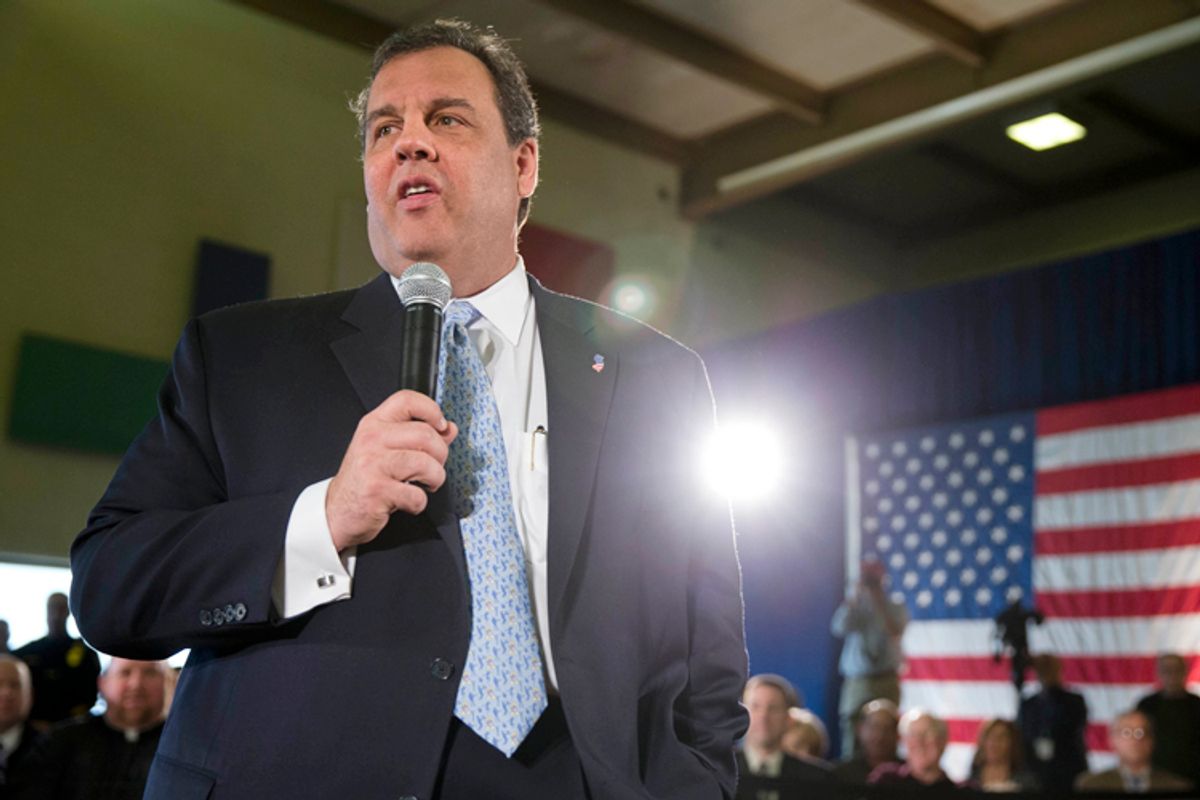The impression on the ground in New Hampshire this weekend was that Chris Christie isn't out of the 2016 sweepstakes just yet. He has a bluntness that corresponds well with New Englanders. Like John McCain, who was similarly dead-in-the-water in 2007, Christie could host hundreds and hundreds of town halls -- the format at which he most excels -- and pull off a victory in a state that's going to be far more competitive than it was in the last cycle. He's just too talented to be the complete non-factor that he's seemed to be in the first few months of 2015.
Christie's New Hampshire trip was a short-term success. The introduction of his risky plan to cut "entitlements" landed him squarely back in the discussion and stoked an intra-party debate about Social Security, putting his rivals on the spot. Sure, some bad news dropped for Christie Monday night: His longtime ally, New Jersey state Sen. Joe Kyrillos, has defected to Jeb Bush. But there's another way of looking at this: the move was long expected, and Bush's campaign-in-waiting confirmed that Kyrillos had donated to Bush's PAC back in March. This suggests that either Kyrillos or Bush's people were waiting for the opportune time to go public with the news -- like after, say, a weekend of good press for Chris Christie.
Is Christie the John McCain of this cycle? The super-early favorite who hits rock bottom but gradually works his way back to the top, just in time for voting to begin? The only honest answer to this question is "who the hell knows?" -- because there is literally no way of knowing. But lest anyone get carried away by a couple of good news cycles for Christie -- and lordy, did I ever hear some reporters get carried away about Chris Christie in New Hampshire this weekend! -- it's worth looking at the various really bad numbers and baggage that Christie would have to surmount in order to prevail, or even remain competitive, within a historically competitive field.
The most obvious problem looming for Christie in the near term is the resolution of the federal Bridgegate investigation. The New York Times recently reported that indictments are about to drop. (Always worth keeping in mind: there have been approximately 800 different "Bridgegate indictments coming any day!" stories over the past year, and thus far they've all been wrong. But the New York Times believes that its sources are super serious this time, so.) If U.S. attorney Paul Fishman indicts Christie himself, of course, that's the end of Christie's presidential ambitions and probably his tenure as governor of New Jersey, too. It would be bad enough, though, if several of Christie's aides or cronies were indicted. His pre-campaign has hinged on convincing donors and operatives, to limited success, that Bridgegate is a thing of the past. Unless the investigation clears everyone of criminal wrongdoing, that's not true.
Then there's Christie's unpopularity in New Jersey, the go-to cudgel for his opponents should Christie's primary fortunes begin to rise. His approval rating has been poor for some time and it's still not moving in the right direction. A Quinnipiac poll released yesterday showed Christie's approval rating at 38%, with 56% disapproving -- the worst snapshot yet. These are atrocious numbers for a governor who won a landslide reelection less than two years ago.
Relatedly, Moody's just downgraded New Jersey's credit rating for a ninth time since Christie became governor, and the state ranks nearly dead last in job creation. It's not necessarily fair to pin all these things on a single figure when the state's structural problems have been festering for some time. But political life is unfair and these attacks will hurt. Oh, how they'll hurt. They'll hurt like nobody's business!
Christie's unpopularity isn't limited to New Jersey, either. A CBS News poll at the end of March asked Republican voters if they would consider voting for each potential presidential candidate. Out of 12 candidates, only Christie and Lindsey Graham -- who's mostly flirting with a presidential candidacy for kicks -- received more "no" than "yes" responses. Forty-two percent of Republican voters said they would not consider voting for Christie, the highest by far among supposedly viable candidates.
Lastly, it should also be noted that though Christie received short-term pundit plaudits for his "authenticity" in laying out specific "entitlement" reforms, in the long-term, well, a campaign centered on cutting Social Security and Medicare is still a very difficult sell.
Christie is a superb political talent, and pundits who pin his chances of winning the nomination at zero do so at the risk of their own reputations. But before we argue that Christie has turned a corner and is once again ascendant, let's first see some hard evidence that that's in any way true.

Shares